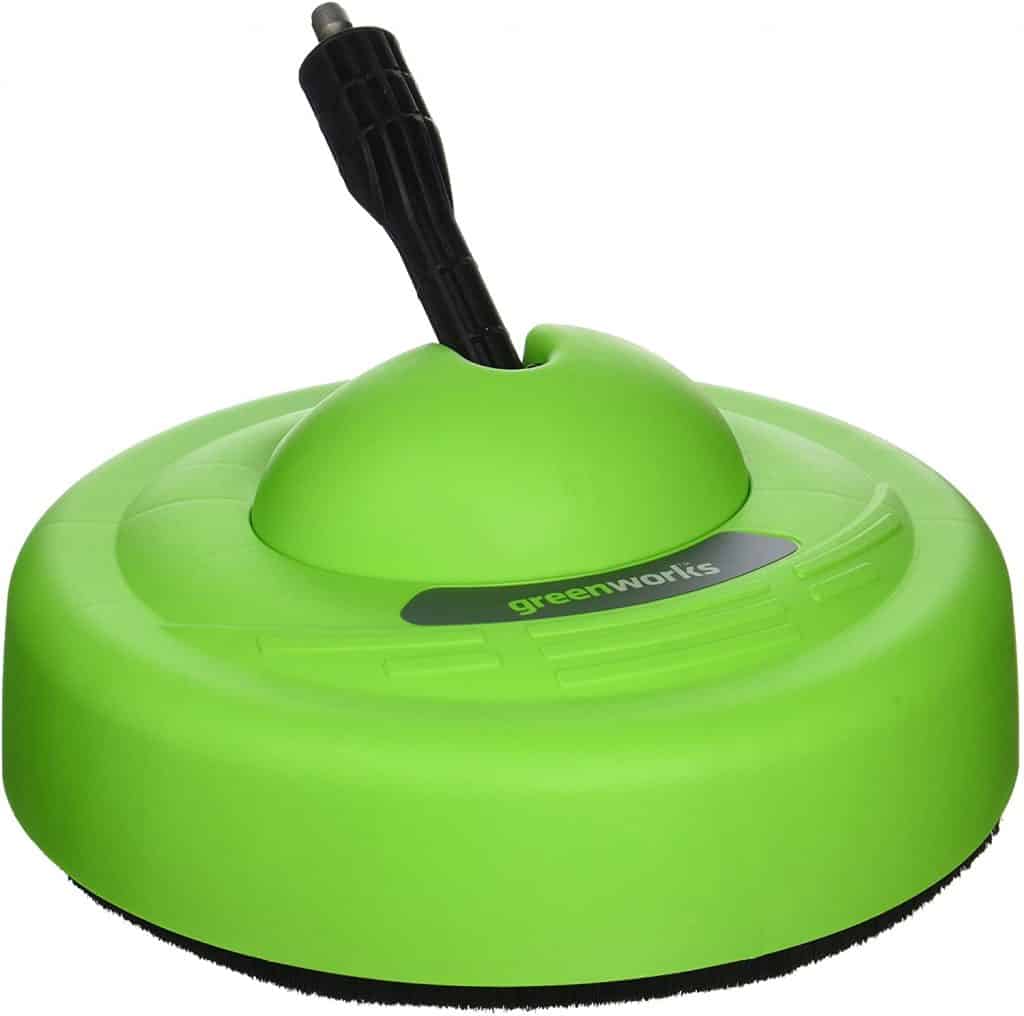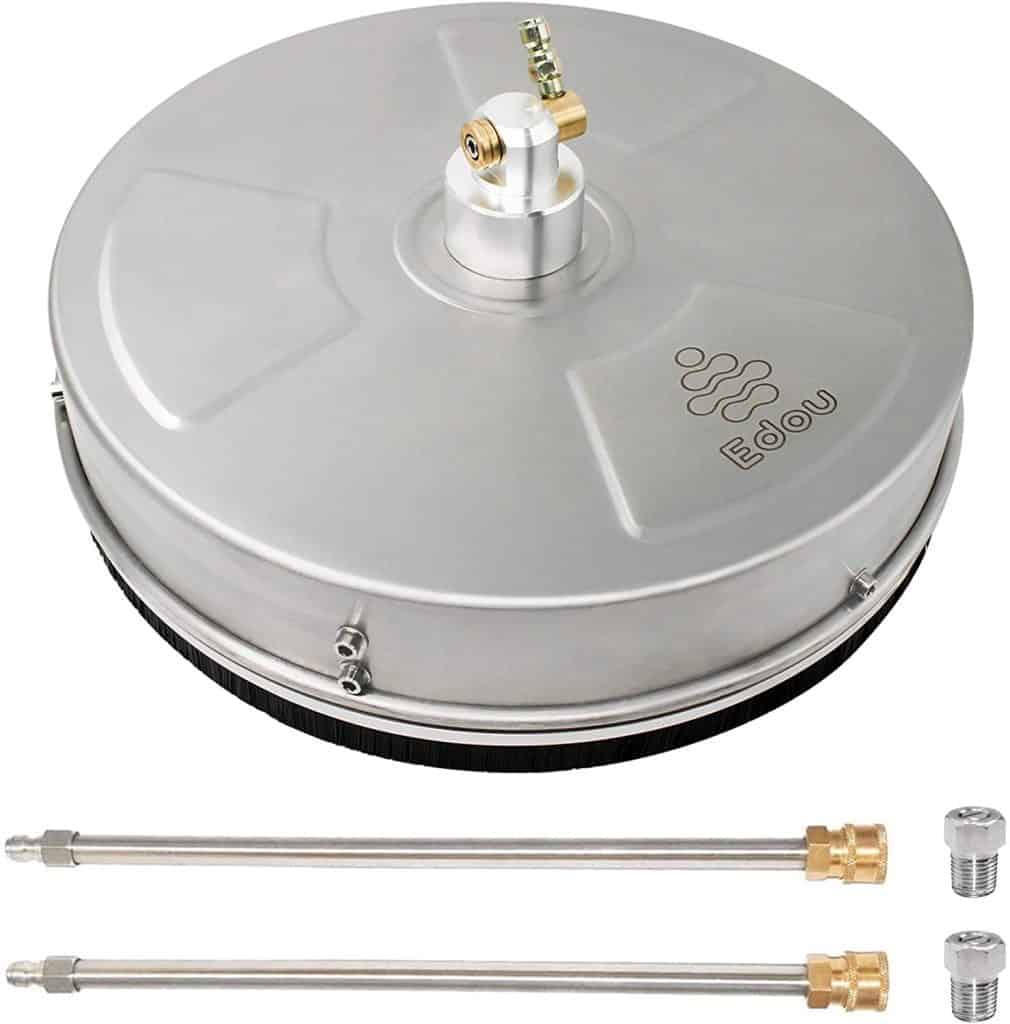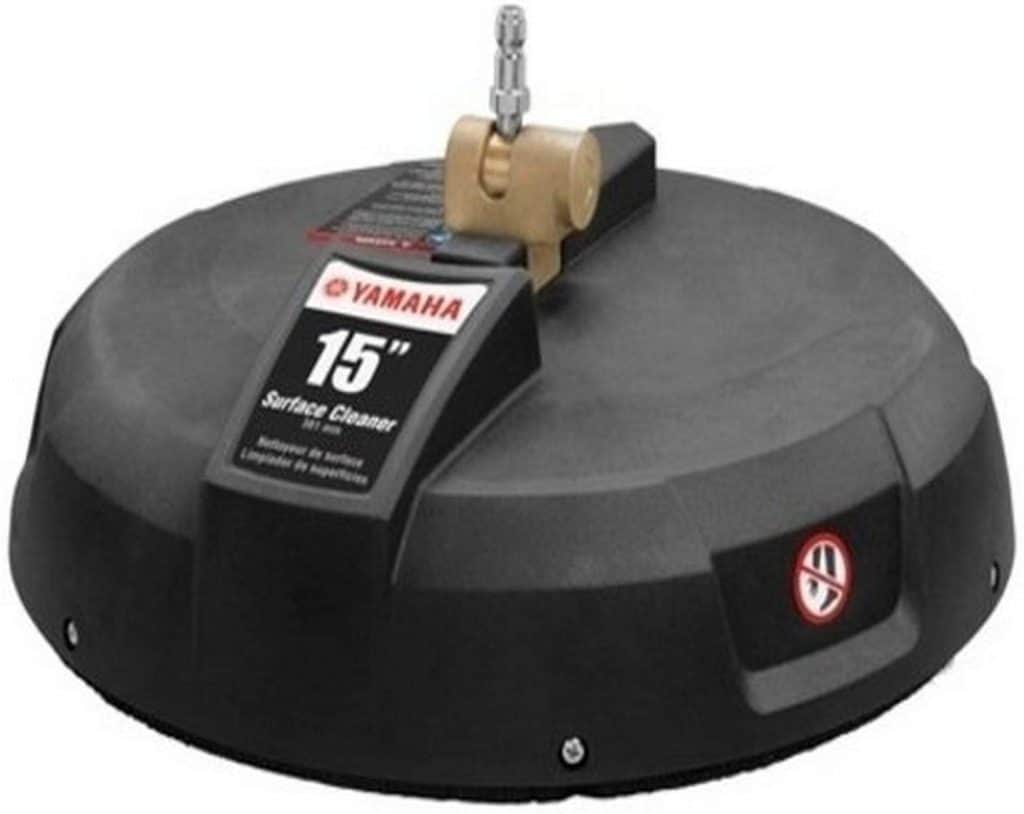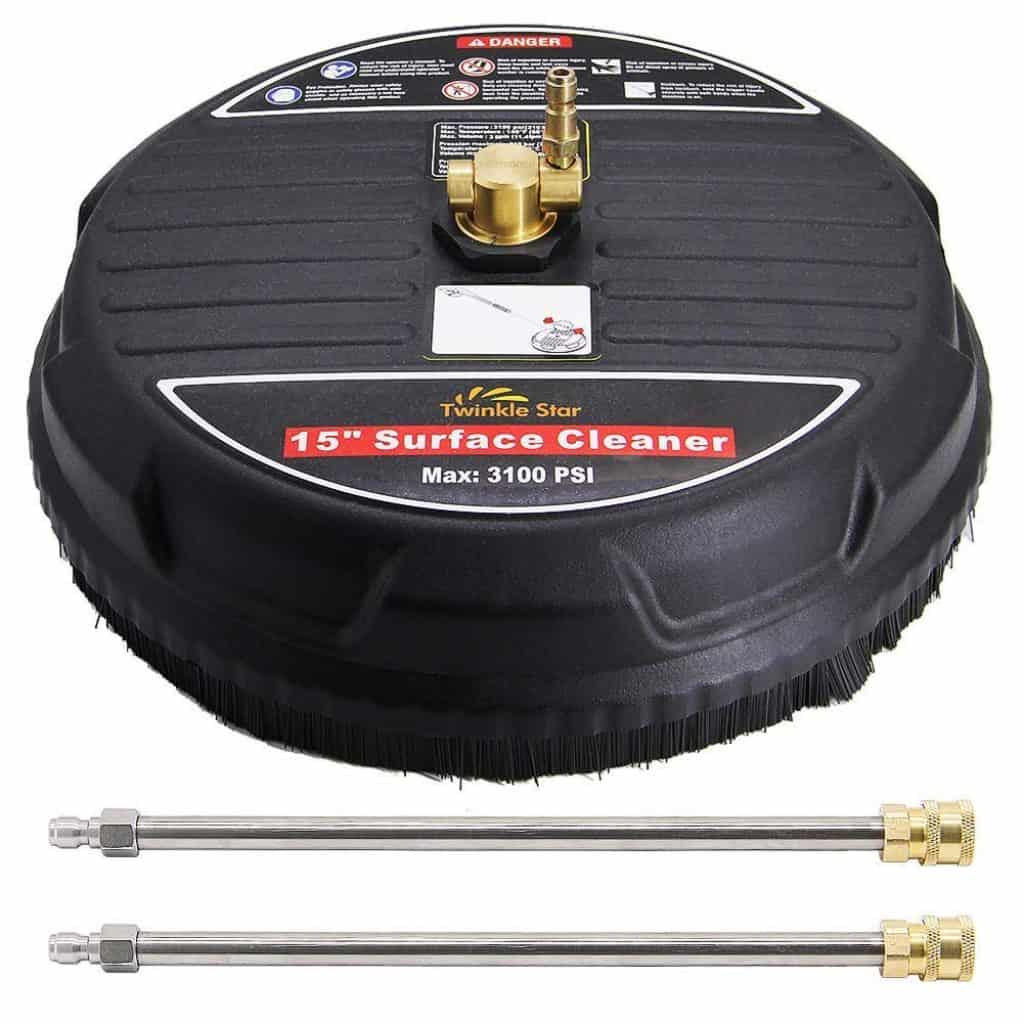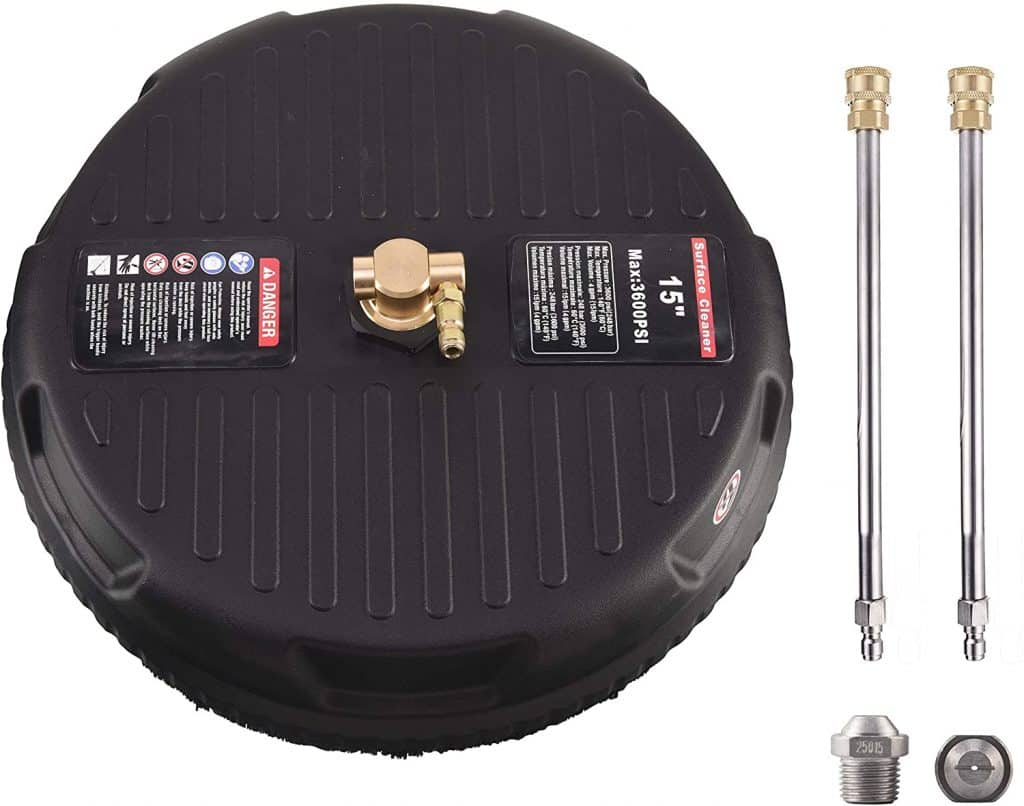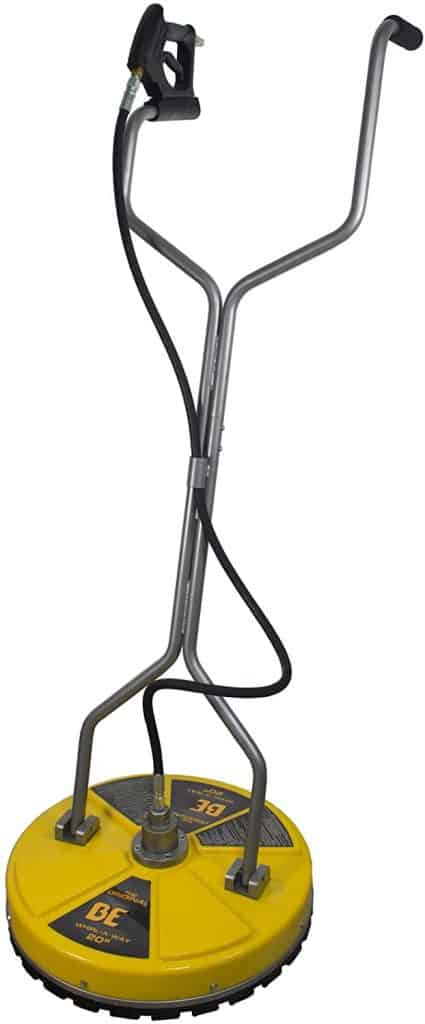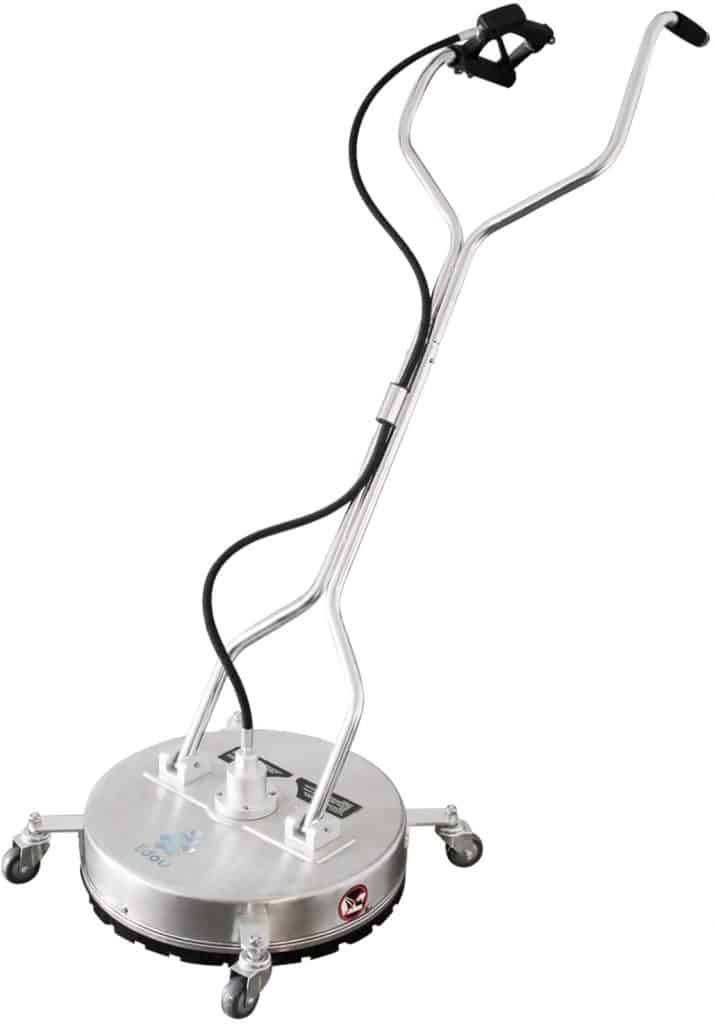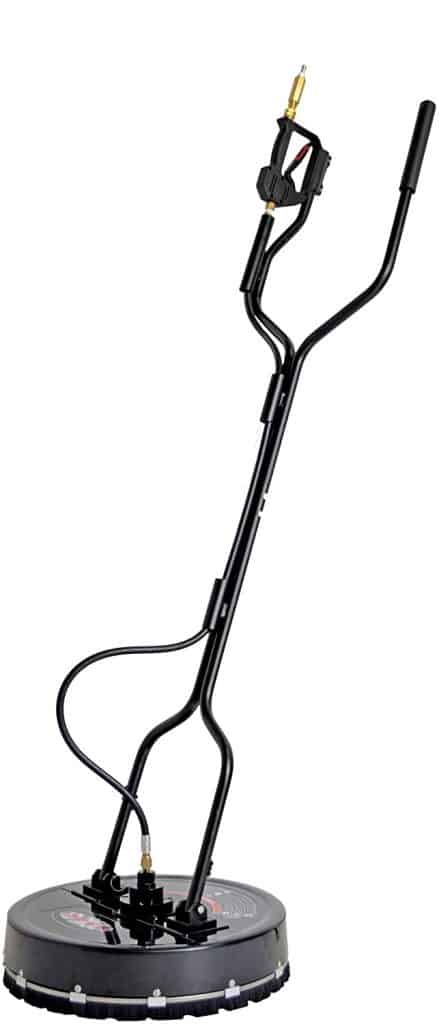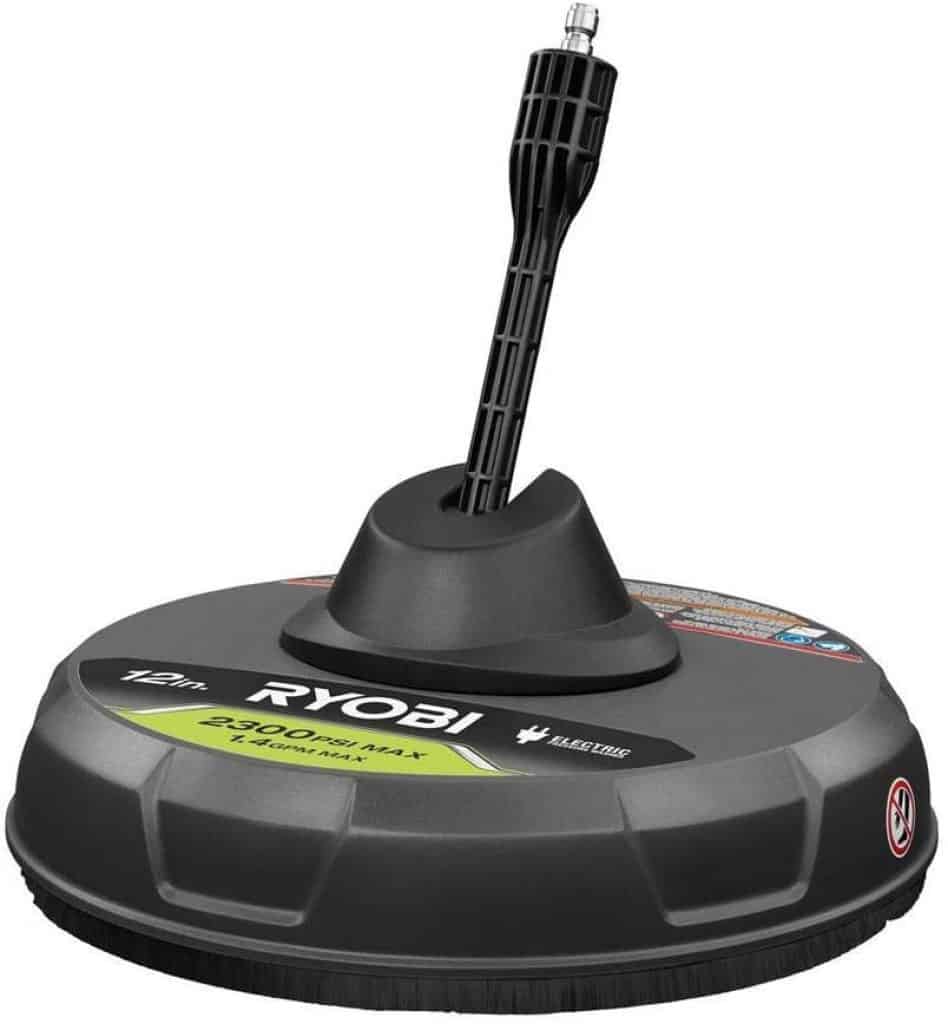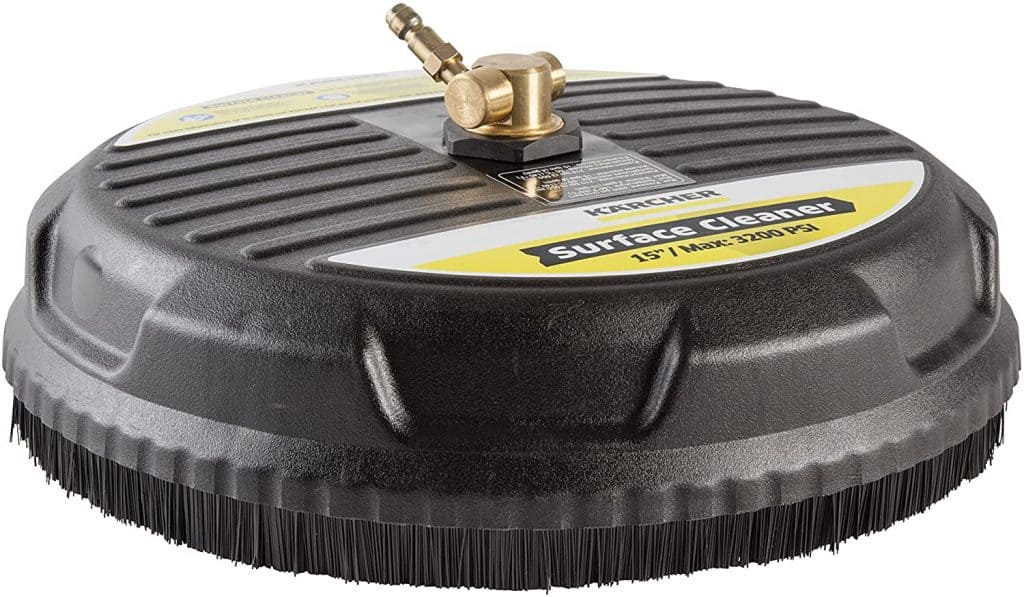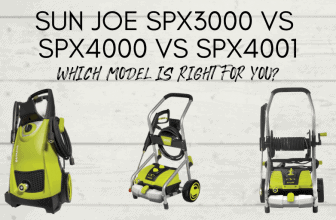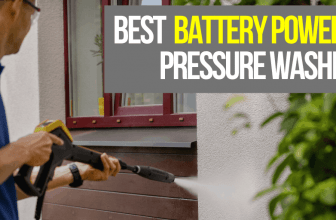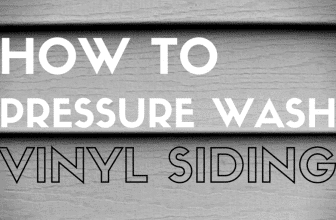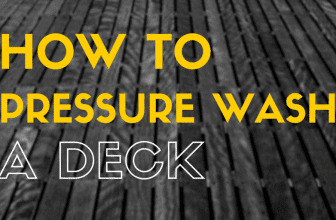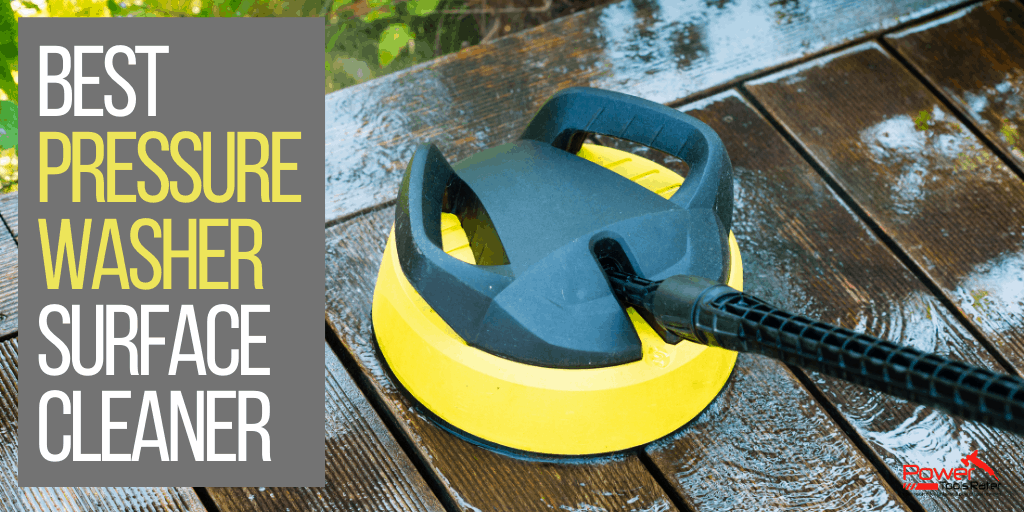
This post may contain affiliate links. This small commission costs you nothing and allows us to write more great power tool reviews for you.
Best Pressure Washer Surface Cleaners: Winners
- Best for Limited Budgets – GreenWorks Universal 30012
- Best for the Money – EDOU 15″ Stainless Steel
- Best for Cleaning Cement, Driveways, and Sidewalks – Yamaha ACC-31056-00-18
- Best for Cleaning Decks and Pools – Twinkle Star 15″
- Best for Cleaning Fences and Walls – M MINGLE 15″
- Best for Cleaning Large Areas – BE Pressure Xstream Whirl-A-Way
- Best for Heavy-Duty Cleaning – EDOU 20″ Commercial
- Best for Gas Pressure Washers – Simpson Cleaning 80182
- Best for Electric Pressure Washers – Ryobi 12″ Surface Cleaner
- Best for Combo Use – Karcher 15″ Surface Cleaner
Pressure washers are amazing tools. People all over the internet love showing off dramatic transitions from grimy deck to shiny, like-new wood.
However, pressure washers have their weaknesses.
You get water everywhere. Also, they can only clean a small portion of your fence or driveway at a time.
What if there was a way to clean a much larger surface area while minimizing overspray?
That’s what surface cleaner attachments are for!
You attach one of these tools to your existing pressure washer’s wand and can get the job done in a third of the time.
With less water, too!
The 10 Best Surface Cleaner Attachments for Pressure Washers
GreenWorks Universal 30012
Pressure washers are not cheap. Surface cleaners are an additional investment.
The GreenWorks 30012, a universal surface cleaner attachment for pressure washers, is a good budget option for trying out a surface cleaner.
The cleaning area is only 11″ wide, which is smaller than almost every other surface cleaner. The tool is half as expensive, though!
If you have a small driveway or patio then you don’t need to spend the money on a larger model anyway.
Specs
- Cleaning Diameter: 11″
- Weight: 1.8 lbs
- Rated PSI: 2000
- Fitting: 1/4″ quick connect
- Compatibility: Electric pressure washers
Pros
- Cuts the effort expended during cleaning in half
- Inexpensive
Cons
- Doesn’t clean as fast or thoroughly as other surface cleaners
- Rated for only 2,000 PSI
EDOU 15″ Stainless Steel
EDOU’s 15″ stainless steel surface cleaner is a long-lasting choice if you are worried about the plastic construction of other surface cleaners.
This model is on the more expensive, though it still costs less than a hundred dollars. You get a stainless steel body and brass connections that will outlive most other surface cleaners.
The EDOU 15″ is rated for between 2,000 and 4,000 PSI. Unlike many other manufacturers, EDOU gives the flow rates as well: Between 1.8 GPM and 4.0 GBM.
The weight makes this surface cleaner better for horizontal surfaces than vertical surfaces.
Specs
- Cleaning Diameter: 15″
- Weight: 8.63 lbs (including accessories)
- Rated PSI: 4000
- Fitting: 1/4″ quick connect
- Compatibility: Combo
Pros
- Comes with two 15″ extensions and a maintenance kit
- Durable construction
- Powerful
- Sealed bearings
Cons
- On the expensive side
Yamaha ACC-31056-00-18
The Yamaha ACC-31056-00-18 is an industrial-looking tool that gets the job done without messing around.
It’s rated for a maximum of 3,300 PSI and a minimum of 2,300 PSI. You might be able to power it with a powerful electric washer but it is designed for use with a gas washer.
Several users have reported their unit ceasing to spin after several uses. This seems to be due to an excess amount of threadlocker added during manufacturing.
Disassembling the Yamaha and cleaning the nozzle fixes the problem, and thankfully, disassembly is easier than most other surface cleaners!
Specs
- Cleaning Diameter: 15″
- Weight: 4 lbs
- Rated PSI: 3300
- Fitting: 1/4″ quick connect
- Compatibility: Gas pressure washers
Pros
- Easy disassembly and cleaning
- Not known for leaving streaks, zebra lines, or swirls
Cons
- Potential excess threadlocker issues
Twinkle Star 15″
The Twinkle Star 15″ surface cleaner comes with more than just the surface cleaner itself.
It comes with two pressure washer extension wands, both of which are 15″ long. You can use them to push the surface cleaner along surfaces that might otherwise be awkward to clean, such as a pool.
The device is rated for up to 3,100 PSI, which is gas washer territory. Though, powerful electric washers will work as well. It just won’t be as effective.
It’s recommended to keep the pressure washer’s nozzle moving when cleaning a wood deck[1]. The Twinkle Star does that for you!
Specs
- Cleaning Diameter: 15″
- Weight: 5.85 lbs (includes accessories)
- Rated PSI: 3100
- Fitting: 1/4″ quick connect
- Compatibility: Universal
Pros
- Comes with two 15″ wand extensions and a pin for clearing the nozzles
- Works with weaker pressure washers, though they will not give enough power to lift the unit off the ground
Cons
- The polymer construction is not as heavy-duty as other surface cleaners
M MINGLE 15″
The M MINGLE 15″ pressure washer is rated for 3,600 PSI, which is on the high end for a non-commercial surface cleaner.
This is an impressive amount of power for a pressure washer attachment, especially for the surprisingly-low price tag.
The manufacturer claims that it works with both gas and electric washers, but don’t expect it to clean as quickly with an electric washer.
Notably, the M MINGLE surface cleaner comes with replacement nozzles so you can get right back to cleaning if one becomes clogged.
The bristle skirt is extra flexible, making the M MINGLE a good choice for walls and fences.
Specs
- Cleaning Diameter: 15″
- Weight: 5.14 lbs (includes accessories)
- Rated PSI: 3600
- Fitting: 1/4″ quick connect
- Compatibility: Gas and electric
Pros
- Comes with two extension wands and two replacement nozzles
- On the more powerful side
Cons
- May not be adequately powered by electric washers
BE Pressure 85.403.007 Xstream Whirl-A-Way
Most non-commercial surface cleaners attach to your pressure washer’s wand.
They use the water pressure to lift off of the ground, but are not very ergonomic for long-term use.
The 85.403.007 Xstream Whirl-A-Way by BE Pressure is an exception that not only makes it easy to clean for hours at a time but will also cut down your cleaning time.
It has a 20″ wide cleaning area and can handle up to 4,000 PSI at 8 GPM. More importantly, it has two built-in handles.
However, it is several times more expensive than other surface cleaners!
Specs
- Cleaning Diameter: 20″
- Weight: 8 lbs
- Rated PSI: 4000
- Fitting: 1/4″ quick connect
- Compatibility: Gas washer
Pros
- Ergonomic handles
- Handles temperatures up to 180 F
- High cleaning power (4,000 PSI and 8 GPM flow rate!)
- Large cleaning area
- Zero wall clearance
Cons
- Expensive
EDOU 20″ Commercial
Commercial surface cleaners have been mentioned several times now. Why not try one out?
The EDOU 20″ Commercial surface cleaner is an upgraded version of the stainless steel model reviewed above.
It adds ergonomic handles and four casters to let you clean all day long with minimal effort, even when the water pressure is off.
This surface cleaner comes with adapters for a wide variety of hoses so you can take advantage of the 4,500 PSI maximum working pressure.
The minimum pressure is 2,000 PSI, so this surface cleaner is compatible with some electric washers!
Specs
- Cleaning Diameter: 20″
- Rated PSI: 4500
- Fitting: 3/8″ & 1/4″ quick connect; M22-14 or 15 mm Male
- Compatibility: Gas and electric washers
Pros
- Ceramic core handles high pressures well
- Comes with adapters and a maintenance kit
- Handles hot water up to 140 F
- Has handles and caster wheels for minimum effort while cleaning
Cons
- Expensive
- “Only” 4 GPM flow so not as much cleaning power as the BE Pressure Whirl-A-Way
Simpson Cleaning 80182
Gas-powered pressure washers are more powerful than electric washers. Why not take advantage of that power with the Simpson Cleaning 80182?
This is a commercial surface cleaner that can handle up to 4,500 PSI with a flow rate of up to 8 GMP and a cleaning diameter of 20″, cutting your cleaning time considerably.
Simpon Cleaning 80182 is designed to handle hot water at temperatures up to 212 F! You’ll see 140 F, 212 F, and 300 F as the maximum temperature on different websites but the manual specifies 212 F.
Specs
- Cleaning Diameter: 20″
- Weight: 29 lbs
- Rated PSI: 4500
- Fitting: 3/8″ quick connect
- Compatibility: Gas washer
Pros
- Can take advantage of the full power of gas pressure washers
- Stainless steel and brass construction for durability
Cons
- Heavy
- Vertically-angled handles may not be as comfortable for some people
Ryobi 12″ Surface Cleaner
If you have an electric pressure washer then a high-pressure surface cleaner will not be a good fit for your tool.
The Ryobi 12″ surface cleaner was designed with electric pressure washers in mind and can handle low pressures of 1,600 PSI, or even less!
The pressure maxes out at 2,300 PSI and the cleaning area is only 12″, so do not expect as much cleaning power out of the Ryobi surface cleaner as you’d get from others.
However, it’s still a good match for an electric pressure washer.
Specs
- Cleaning Diameter: 12″
- Weight: 2.51 lbs
- Rated PSI: 2300
- Fitting: 1/4″ quick connect
- Compatibility: Electric washers
Pros
- Compatible with battery-powered electric power washers
Cons
- Small cleaning area
Karcher 15″ Surface Cleaner
The Karcher 15″ surface cleaner is a great combination of price and features, suitable for both gas and electric washer use.
This model maxes out at 3,200 PSI but can handle much lower pressures. It will not be as effective at cleaning, but can still be used with battery-powered electric pressure washers.
The maximum water temperature is 140 F and the maximum flow rate is 2.7 GPM. So, the Karcher is mid-range in capabilities, but it is still well designed.
Specs
- Cleaning Diameter: 15″
- Weight: 3.8 lbs
- Rated PSI: 3200
- Fitting: 1/4″ quick connect
- Compatibility: Gas and electric washers
Pros
- Can be used with a wide variety of pressures
Cons
- Relatively slow rotation speed of 1,500 RPM
Benefits of Using a Surface Cleaner Attachment
If you already have a pressure washer then you may be wondering:
What’s the point of a surface cleaner?
The truth is that a surface cleaner is a useful piece of equipment that pushes a pressure washer to its full capabilities.
A surface cleaner is a thick disc that’s connected to the pressure washer. Inside is a bar with two nozzles that rotates and there are bristles, often nylon, to help hold the water in.
The rotating bar splits the water stream in two, halving the pressure. At first, this seems like a downgrade.
However, a surface washer actually has many benefits.
Even a small surface washer contacts more of the surface at any point in time than a pressure washer with a 25-degree or even 40-degree nozzle.
This alone cuts down the amount of time you need to spend cleaning considerably.
Also, a surface cleaner is less potentially damaging to certain woods, concrete, and aggregate driveways than a pressure washer[2].
This is because the effective pressure is halved and the nozzles spin, so the spray isn’t as concentrated on one area.
And that’s not as bad as it seems for cleaning, because the nozzles are close to the surface, whereas you may be holding the pressure washer wand much farther away!
Another advantage of surface cleaners is how they have nylon bristles to hold in the water.
Pressure washers are notorious for spraying water everywhere. Nothing holds the water in!
Surface washers keep the water where it needs to be, not on your pants or in your face.
In fact, holding the water pressure close to the surface in this way has another benefit:
The water pressure pushes up on the surface cleaner!
This causes it to effectively hover, so you can glide the surface cleaner around.
The water pressure works for you instead of against you!
Note that this is partially affected by what you’re cleaning.
Decks, with the gaps between the slats, will cause less of a hover effect. And it won’t work for you when cleaning vertical surfaces such as walls and fences (though you will still be able to glide the surface cleaner around with minimum friction).
Overall, this provides a more effective cleaning experience, saving you time and money (from less wasted water).
A surface cleaner can clean a flat surface in three, four, or even five times the speed at which you’d clean it with a pressure washer!
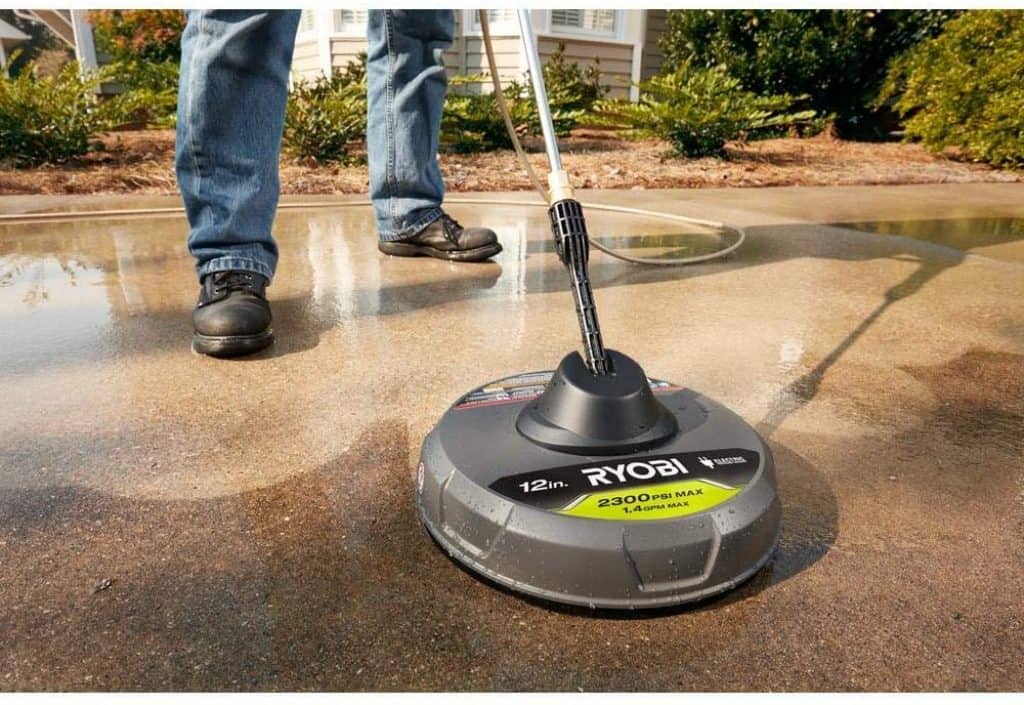
What to Consider When Choosing a Surface Cleaner Attachment for Your Pressure Washer
All surface cleaners are similar in several ways:
They connect to a pressure washer through a quick connect fitting and have a rotating bar with nozzles on either end through which the water flows.
However, certain design differences can make or break a surface cleaner for your specific use case.
Let’s look at those in detail.
Water Pressure
The biggest consideration is the rated water pressure of the surface cleaner.
The internals of every surface cleaner has been designed to be used within a certain water pressure range.
The higher the water pressure the more cleaning power you will get out of the surface cleaner.
However, you do not want to attach a surface cleaner to a pressure washer that is more powerful than what the surface cleaner is rated for.
The pressure-bearing components may not be able to handle the higher pressure, causing them to leak, thus drastically lowering the cleaning power.
Also, attaching a surface cleaner rated for high pressures to a weak pressure cleaner will not only cause sub-par results, but it may not even be able to clean at all!
Ideally, you want to buy a surface cleaner rated to exactly the maximum PSI of your pressure washer.
This may mean having to step down in cleaning area.
But, having a well-tuned system will allow you to clean faster than attaching a high-PSI surface cleaner to a low-PSI pressure washer.
“PSI” means “pounds per square inch,” by the way.
Cleaning Power
Water pressure is not the only indicator of what’s called Cleaning Power.
You also need to take the maximum water flow into consideration.
Water flow for surface cleaners and pressure washers is given in gallons per minute, or GPM.
Like PSI, your surface cleaner will be rated to a certain GPM.
However, the pressure washer has to be able to provide this much water flow.
So, you want to match your surface cleaner’s GPM to the pressure washer’s GPM for optimal performance.
Gas or Electric or Combo?
Electric pressure washers tend to be on the low side of water pressure and gas pressure washers on the high end.
Many surface cleaner manufacturers will specify that their tool is designed for use with gas or electric washers, or both.
In reality, the surface washer does not know what’s powering the pressure washer. All it knows is how much water pressure it’s receiving.
Don’t worry about this compatibility too much.
Just match the surface cleaner’s PSI to your pressure washer’s PSI.
Construction Materials
Some surface cleaners are made from polymer. Others are made from metal.
Metal is more durable than plastic but is more expensive.
If you are only going to use the surface cleaner for a short period of time then it’s a good idea to save money and buy one made from plastic.
However, if you have a large area to clean, then it may be worth the while to buy an all-metal unit.
You’ll experience less wobbling and it will last longer, especially if you have to transport the surface cleaner and potentially expose it to rough conditions.
Ergonomics
Most surface cleaners attach to your pressure cleaner’s wand.
This is fine for several hours’ worth of work.
But, what if you have to spend all day cleaning your driveway and sidewalk and patio and pool and…
If you have a lot of surface area to pressure wash, then you want a surface cleaner with built-in handles. These are much more comfortable to use than a wand!
However, handles add a lot of expense.
Caster Wheels
Surface cleaners function like miniature hovercrafts, using water pressure to provide buoyancy and keeping them floating above flat surfaces.
What if you have to deal with rough surfaces, though? Such as an aggregate driveway or sidewalk that’s partially broken up?
Caster wheels make using a surface cleaner much easier on non-flat surfaces.
However, they will make the surface cleaner more expensive.
You can find caster kits to upgrade some surface cleaners, though!
Usable Water Temperature
Not all surface cleaners are designed to withstand hot water temperature cleaning.
If the model in question does not specify a maximum water temperature then it’s wise to presume that you can only use cold water with the surface cleaner.
Hotter water does clean better, so, if you have to clean an oil-stained driveway or lots of mold on your deck, you may want to pay more for a surface cleaner that can handle higher water temperatures.
Conclusion
Surface cleaners are nifty additions to your pressure washer that allow you to clean more in a shorter period of time.
They also prevent overspray, keeping you and your plants dry!
The cost of a surface cleaner is generally less than the price you’d pay to a professional cleaning company, so it may be worth buying one even for one-off cleaning jobs.
However, once you see how nice your driveway looks after a single cleaning session, you may find yourself cleaning your deck, garage, sidewalk, neighbor’s driveway…
The most important criteria to consider when buying a surface cleaner is to buy one that’s rated for water pressure close to (but not belw) your pressure washer’s maximum output.
If you have an electric pressure washer then GreenWorks and Ryobi make excellent choices.
For higher power gas pressure washers, EDOU makes perhaps the best high-value surface cleaner.
And, if you want ergonomic handles and commercial or industrial class efficiency, consider the Simpson Cleaning 80182.
FAQs
Every surface cleaner gives the maximum flow rate in gallons per minute, or GPM.
How long it takes you to clean the area in question will determine how much water you will use and the specific capabilities of your surface cleaner and pressure washer combination.
A good rule of thumb is that it will take half an hour to clean an area of a driveway large enough to park a car.
A surface cleaner takes your pressure washer and makes it more efficient at cleaning a wide area.
This saves you time when cleaning large surfaces. You may get the job done in one third, one quarter, or one fifth the time!
Surface cleaners also hold in the spraying water, which prevents it from getting everywhere.
Surface cleaner lines generally come from improperly overlapping the surface as you clean it.
Specifically, parts of it are getting cleaned twice, and the rest of the surface isn’t getting quite as clean.
This can be a problem with your technique, pre-cleaning method, or a mechanical issue.
You may need to speed up or slow down until the surface is cleaned equally. Slowing down is the solution much of the time.
Pre-treating with a cleaner can help, too. You may have to experiment with cleaners to find the right one for your surface.
If your technique is good then lines may be from misaligned nozzles, the surface cleaner not sitting flush against the surface, or other alignment issues. These would make the cleaner not clean all of the surface’s area equally.
Did you know that concrete driveways can be damaged by too much water pressure?
Even tough driveway mortar can only handle about 2,500 PSI right next to it[3].
Surface cleaners split the incoming water pressure between several nozzles, so what may be a damaging amount of pressure with a wand will not be destructive with a surface cleaner.
3,000 to 3,500 PSI surface cleaners are recommended for cement driveways. Though, even 4,500 PSI models should pose no problem.
Aggregate driveways are a different story, though even a 3,000 PSI surface cleaner should not damage one.
Surface cleaners are more efficient at cleaning large, flat surfaces than a pressure washer alone.
They save you lots of time and a bit of water.
They also allow you to clean large areas yourself instead of hiring a professional cleaning company, which can save you money!
Not all surface cleaners are designed to be used with hot water. Only use hot water if the cleaner was designed for it!
Surface cleaners are more efficient at cleaning large areas than the standard pressure washer wand, so even with the same cleaning power, a surface cleaner can save you water.
If your surface cleaner is attached to a pressure washer that can use detergent then the surface cleaner can use detergent.
Most surface cleaners use the same 1/4-inch quick connect system so they can connect to both gas and electric pressure washers.
However, the internal system is designed for a specific pressure range
.
Electric pressure washers are weaker than gas pressure washers, so surface cleaners meant for electric washers are not rated for the higher pressures from a gas washer and may get damaged if exposed to too much water pressure.
Lighter-weight surface cleaners can be used on vertical surfaces such as fences or walls with no issue.
However, the heavier metal surface cleaners tend to be more difficult to use in this way.
You may physically be able to use a surface cleaner attachment to clean your car, but this may damage your car’s paint.
Use a tool designed for car washing instead.

